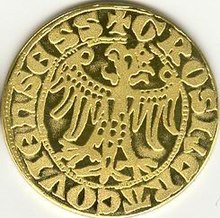| Revision as of 13:53, 30 January 2016 editOwenBlacker (talk | contribs)Autopatrolled, Extended confirmed users, Pending changes reviewers45,082 editsm →top: Corrected language tagging← Previous edit | Revision as of 17:51, 19 May 2019 edit undoGazamp (talk | contribs)Autopatrolled, Extended confirmed users26,651 editsm →References: Added Portal:MoneyNext edit → | ||
| Line 13: | Line 13: | ||
| ==References== | ==References== | ||
| {{Portal|Money}} | |||
| {{reflist}} | {{reflist}} | ||
Revision as of 17:51, 19 May 2019
| This article does not cite any sources. Please help improve this article by adding citations to reliable sources. Unsourced material may be challenged and removed. Find sources: "Kraków grosz" – news · newspapers · books · scholar · JSTOR (January 2007) (Learn how and when to remove this message) |


The Kraków grosz (Template:Lang-la (sing.), grossi cracovienses (pl.), Template:Lang-pl, Template:Lang-de) were medieval silver coins minted in 14th century Kraków.
Following the Bohemian Prague groschen in use since 1300, and other large silver Groschen-type coins issued in the Holy Roman Empire, the coin was introduced in 1367 during the reign of king Casimir III of Poland.
Its obverse and reverse sides had the following text:
- KAZIMIRVS PRIMUS DEI GRATIA REX POLONIE
- GROSI CRACOVIENSESS (sic!)
References
This coin-related article is a stub. You can help Misplaced Pages by expanding it. |
This Polish history–related article is a stub. You can help Misplaced Pages by expanding it. |